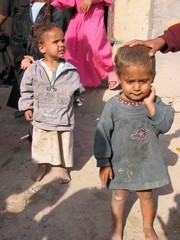 Poverty, poor health and a lack of education plague a new generation of Iraqi children.
Poverty, poor health and a lack of education plague a new generation of Iraqi children.BAGHDAD, 19 Nov 2006 (IRIN) - With insurgency and sectarian violence continuing to escalate in beleaguered Iraq, children are some of the most vulnerable. Facing limited healthcare and education as well as witnessing death and destruction on a daily basis has made their existence increasingly miserable.
While a number of awareness initiatives were launched worldwide on 19 November to commemorate the United Nations World Day for Prevention of Child Abuse, insecurity in Iraq makes it almost impossible for NGOs to operate effectively in the country to help needy youngsters.
"I need to breath. I feel like I live in a prison. My family do not allow me to go to school and just take me when they feel it is safe. This is not an unusual thing in Iraq today," Nur Sami, 11, said. Nur says she and her friends live in fear as some of her friends have been killed over the past three years.
"After two of my friends were raped while returning from school, my family went crazy and [stopped me going to school] because they wanted to keep me safe, but even your family cannot always keep you safe," she added.
Nur recalled an incident when a 12-year-old friend was picked up from school by her mother. An unknown gang kidnapped and raped them repeatedly for three days before killing them. "Is that the destiny of an innocent girl in Iraq? Is that the human rights that we hear everyone taking about?" Nur asked.
Lack of basics for life
In addition to the danger of being violently killed, a lack of basic health services and good quality food means children in Iraq face a host of other threats. Iraq's almost 4.8 million children only have access to one of the worst health systems in the Middle East. Malnutrition and waterborne diseases such as diarrhea have become common, health officials say.
"Children are dying everyday because of a lack of essential medical support. The bad sewage system and lack of purified water, particularly in suburbs, has been a serious problem which might take years to solve," Ahmed Obeid, press officer in the Ministry of Health, said.
"Doctors are struggling to maintain the health of millions of innocent children, but the basics should be dealt with first. If the sewage and water systems are not improved, more children will die from diseases such as diarrhoea and vomiting, which are simple to cure in normal times," Obeid added.
According the United Nations Children’s agency (UNICEF), one in four Iraqi children aged under five is chronically malnourished. One in eight dies before their fifth birthday.
"My nine-year-old daughter died last month because there was no treatment in the hospital for her disease and we couldn't afford medicine. Our salary is not enough to buy [medicine and] food for my other five children," Hania Youssef, mother of six, said.
"When I tell people that my lovely daughter Sarah died from diarrhoea, they are surprised as it is a simple disease to treat normally," Hania added.
Education hampered by security
According to the Ministry of Education, at least 30 percent of all Iraqi children are not going to school, either because of violence or because families cannot afford to send them and prefer them to work instead.
"There is a lack of investment in education in Iraq. Schools need urgent repair, books have to be changed and teachers [who have fled] should come back to teach. This year is going to be the worst in the history of Iraq and even during the [Gulf] war the situation was better," said Khalid Samouw, an officer at the Education Ministry's analysis department.
"We do not expect a lot from this generation [of children]. For sure, good professionals will not be created because their [educational] basis is bad compared to years ago. They lack information and experience because violence has taken it from them,” Samouw added.
Suha Ayman, 10, cannot bear not going to school and learning. She said it is the only thing left for her to live for.
"Coming to school is a way to leave my house, which my family has made a prison for me. When I'm at home, I cannot even stand at the front door to speak with my friends in the street. I have been having headaches every day and the doctor told me that it is pressure of the violence and terror in our country," Suha said.
Reproduced with the kind permission of IRIN
Copyright IRIN 2006
Photo: Copyright IRIN
Disclaimer: This article does not necessarily reflect the views of the United Nations or its agencies
